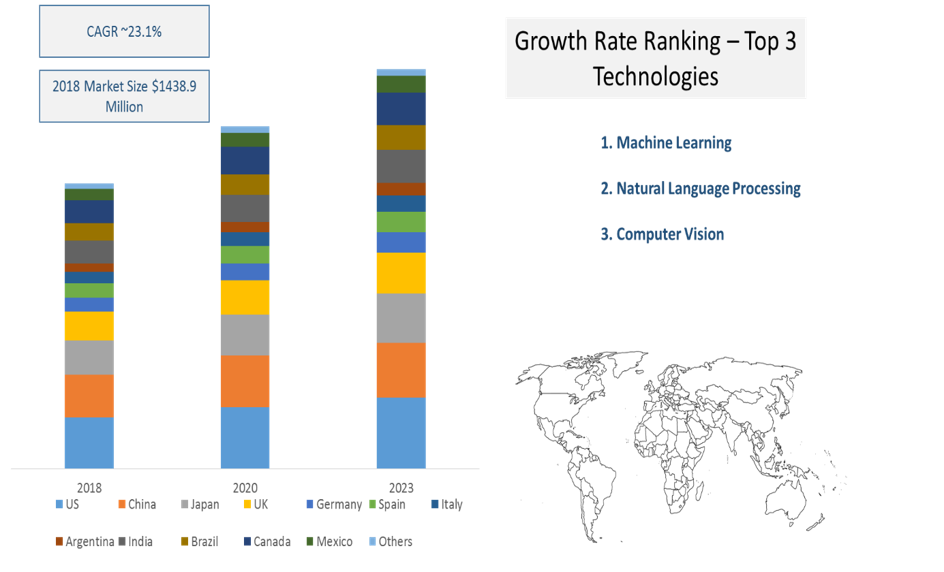Development of AI technology is helping the overall healthcare industry to flourish. A lot of transformations have occurred across various applications such as in diagnosis, advanced medical devices, drug discovery, hospital management, etc. Drug discovery is one of the emerging fields that is playing an important role in the growth of AI in Pharmaceutical Market Ecosystem. Leading pharmaceutical companies are working on deploying AI. Atomwise is one of the leading AI companies that helps top pharmaceutical companies such as Eli Lilly, Merck, Pfizer, etc., in the drug discovery process.
In the year 2019, Eli Lilly has made an agreement to pay Atomwise up to US$ 1Mn per target in discovery milestones. This partnership focuses on speeding up the drug development process that adds Atomwise’s advanced AI analytics over Eli Lilly’s researched molecules. Merck is working with Atomwise’s advanced AI technology that helps scan existing medicines and improve on the molecular design that might help fight diseases. Atomwise Inc. entered an evaluation agreement with Pfizer in 2018 to identify drug candidates for target proteins. This partnership will help Pfizer to analyze target proteins by using AI technology. Such new developments boost the overall growth of AI in pharmaceutical Market ecosystem. According to our estimates, the AI in pharmaceutical Market Ecosystem is expected to witness a growth of approx. 23.1% CAGR from 2018 to 2023.

Other start-ups such as Exscientia, Iktos, Biovista, and others are also fueling the growth of AI in Pharmaceuticals Market. Exscientia is an UK-based startup that offers drug discovery engine powered by AI technology. In 2017, Sanofi collaborated with Exscientia to discover small molecule and bispecific small-molecule candidates and to focus more on developing new drug combinations for diabetes and other metabolic diseases. In the year 2019, the company has collaborated with GSK, especially to focus on therapeutic areas such as cardiovascular, oncology, metabolic diseases, and other infectious diseases. GSK has agreed to pay US$ 43Mn to Exscientia if the 10 disease related target milestones are achieved.
Apart from drug discovery, AI in pharmaceutical can also be deployed for the clinical trial processes. Technologies like NLP and Machine Learning are used to correlate diverse data from EHR, medical databases, and trial database to speed up clinical trials. Finding the right patients for clinical trials is a huge and time-consuming process for clinicians. IBM Watson uses Natural Language Processing (NLP) to match the patient criteria more accurately using the EHR data and to quickly provide clinicians a ranked list of eligible patient information.
EMA has outlined 5 strategic goals in 2019. The agency has also proposed the use of AI technologies in the clinical trial process, especially to enhance the data-driven decision support. Such initiatives may further strengthen the AI in Pharmaceutical market.
|
Components |
Technology |
Devices |
Deployment |
|
CPU |
Machine Learning |
Smartphones and Tablets |
Cloud |
|
GPU |
NLP |
Wearables |
On-Premise |
|
Microprocessor (including ASIC) |
Computer Vision |
Workstation Systems |
|
|
FPGA |
Others |
Medical Devices |
|
|
Memory |
Autonomous Robots |
||
|
Modules |
Imaging Systems |
||
|
Storage |
Others |
Drug non-adherence is a major drawback for pharma companies in proving drug efficiency to the real world. During the clinical trials process, patients are asked to submit the data about the medications taken. However, there is no evidence whether the patient took the medicine as prescribed. Patients engaged in the clinical trial follow this traditional procedure, which have a higher chance of false positives that might negatively affect the clinical trial outcome. AiCure, a New-York-based company, tracks the mobile phone of patients and continuously records it. It uses facial recognition technology to identify the patient and monitor whether the patient has taken the tablet as prescribed. This help pharmaceutical companies to monitor patient’s adherence in a more effective manner. These are some of the benefits of adopting AI in Pharmaceutical Market ecosystem. Currently, the adoption of AI in Pharmaceuticals is at an early stage and it is expected to rise in future.

There are many trends that are having an impact on the market forecast. These, when evaluated from a company’s perspective, can drive growth. Our numerous consulting projects have generated sizeable synergies across all regions and all sizes of companies.
|
Company |
Ecosystem Positioning |
Total Revenue (US$) |
Region |
|
Google LLC. |
Solution & Service Provider |
$136.22 Billion |
Global |
|
Intel Corporation
|
Component Manufacturers |
$70.8 Billion |
Global |
|
Sanofi |
Pharmaceuticals |
$38.4Billion |
Global |
|
Eli Lilly and Company |
Pharmaceuticals |
$24.5 Billion |
Global |
|
IBM Corporation |
Solution & Service Provider |
$79 Billion |
Global |
Very few markets have the interconnectivity with other markets. Our Interconnectivity module focuses on the key nodes of heterogenous markets in detail. Processor, Smartphones, and Cloud Computing are some of our key researched markets.

|
Trends |
Components |
Technology |
Impact on Market |
|
GPU boosts drug design and enhances the drug discovery process, which helps pharma companies to examine the target drug molecules more accurately. This has a positive impact on AI in pharmaceutical Market ecosystem. |
GPU |
0.66% |
|
|
There is an increase in the use of artificial intelligence by pharmaceutical companies for making drug discovery more effective and cheaper. Machine learning is used to identify the patterns in data in order to classify or predict new data much faster than human beings |
0.54% |
||
|
Natural Language Processing (NLP) and machine learning technologies are used to connect patients to medical research by extracting diagnoses, symptoms, and test results from patients’ health records to match the clinical trials. |
NLP |
0.66% |

Ask for free product review call with the author

Share your specific research requirements for a customized report

Request for due diligence and consumer centric studies

Request for study updates, segment specific and country level reports
